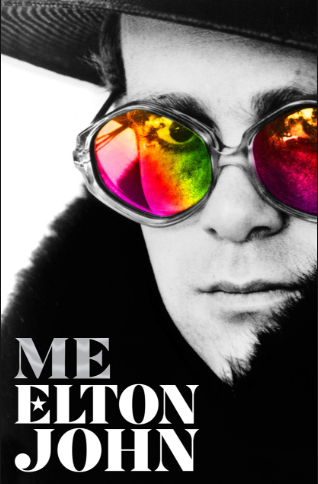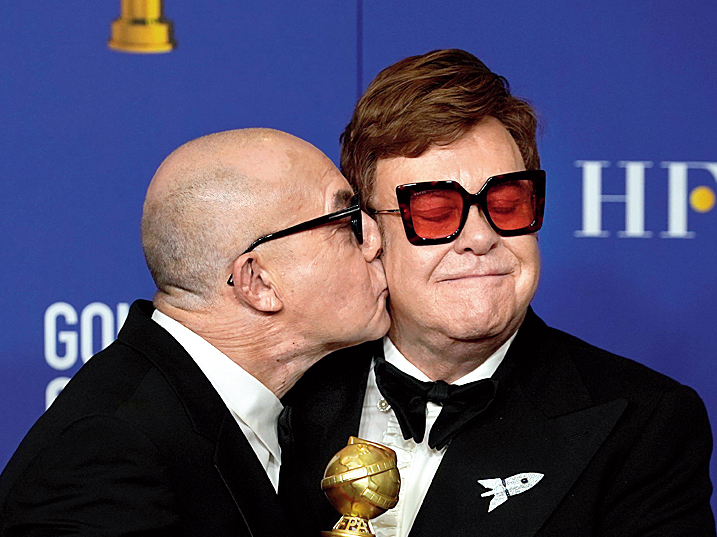Imagine applying for a job after reading an advertisement in the newspaper; appearing for, and failing in, the interview; being handed another failed interviewee’s papers in an envelope, as a sort of consolation prize; almost but not quite chucking said envelope in the dustbin; calling and meeting the other person, a complete stranger, out of politeness; hitting it off — and then going on to form one of the greatest musical collaborations of all time. That, more or less, is the story of the Elton John-Bernie Taupin partnership, one that is still going strong after fifty years, having just received a nomination for Best Original Song for the 2020 Academy Awards for “(I’m Gonna) Love Me Again” from the Elton John biopic, Rocketman, a half-century after their first big hit, “Your Song” (1970). Even more mysteriously, unlike other songwriting duos — Lennon-McCartney jumps to mind, followed by Jagger-Richards — John and Taupin not only do not perform together, they do not even work out of the same room, or the same house, with Taupin writing the lyrics and John setting them to music, largely independently of each other. Just how this strange process works is perhaps the only Big Question that Elton John’s brilliantly hilarious and heartbreakingly self-deprecatory autobiography, simply, if a shade egotistically, titled Me, fails to address.
For everything else — the childhood in an unloving repressive household in the London suburb of Pinner; the discovery of musical talent and award of a piano scholarship to the Royal Academy of Music; the defection to rock and roll and the early years touring dreary clubs and out-of-the-way venues; the sudden onset of fame at age 23; the coming to terms with his homosexuality; the drugs; the marginally bizarre encounters with musical legends (Elvis, Brian Wilson of the Beach Boys); the manic buying and hoarding of, well, everything; the suicide attempts; the legal battles; the sobering up and return to “normalcy”; one can keep going on — there is, if anything, an excess of detail.
Given John’s apparent willingness to discuss almost anything, especially his addictions, in the most elaborate and intimate fashion, this book could easily have swerved into the high-serious confessional mode of the kind made popular by American talk-show hosts (think Oprah, think Ellen). What rescues Me from that particular pitfall is John’s Pythonesque sense of humour and an apparently inexhaustible ability to laugh at himself. Here is John on the time after the fateful meeting with Taupin but before achieving fame, when they were both living with John’s mother and stepfather, Derf (“Fred” spelled backwards): “Lying on the floor, with our headphones on, our latest purchase from Musicland on the turntable and the air heavy with incense smoke, Bernie and I could momentarily convince ourselves that we were artists living a bohemian existence at the cutting edge of the counterculture. Or at least we could until the spell was broken by my mum knocking on the bedroom door, asking to know what that bleedin’ smell was and, by the way, what did we want for our dinner?”

Me By Elton John, Macmillan, Rs 999 Amazon
John does not shy away from discussing the more painful details of his life, including his fraught relationship with his mother, which haunted him until her death in 2017 (and perhaps still does), but here again, it is the humour that acts as the saving grace, transforming the potentially maudlin into the touchingly witty. “If she wanted a row, Mum always knew which buttons to press, because she had installed the buttons in the first place. She still had the ability to make me feel as if I were a terrified ten-year-old back in Pinner, like everything was my fault,” writes John about his 60-year-old self towards the end of the book (he is now almost 73).
Quite apart from the biographical details, there is a great deal in this book that will attract anyone interested in rock and roll or, indeed, popular culture in the West since the end of World War II, seen through the prism of a “ridiculous life”. Did you know that it was the fashion among male British rock and pop stars to give each other drag-queen names and address each other as “darling”? Freddie Mercury, for example, was “Melina, after Melina Mercouri, the Greek actress”, who did not hesitate to address his fellow Queen guitarist as “Mrs May”, and Michael Jackson as “Mahalia” or “Mrs Jackson” (which, John surmises, the King of Pop did not take very kindly to). For the record, John’s oldest pal and rival in the music biz, Rod Stewart, is addressed by him as “Phyllis” and the gravel-voiced-one still calls John “Sharon”.
This acutely observed, brilliantly written, and side-splittingly funny autobiography (for which some of the credit surely belongs to John’s collaborator, The Guardian’s long-time music critic, Alexis Petridis) should be in the library of anyone interested in music, popular culture, rock and roll, or simply how to tell a story. Don’t wait for the paperback. Buy it now.










